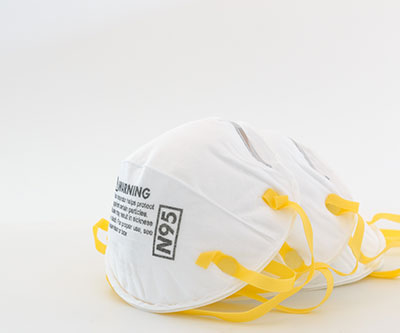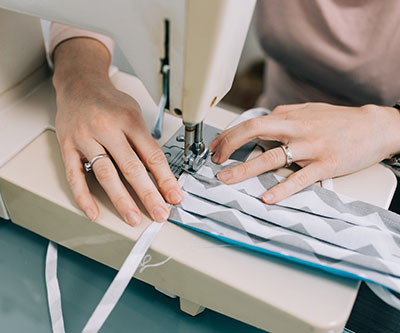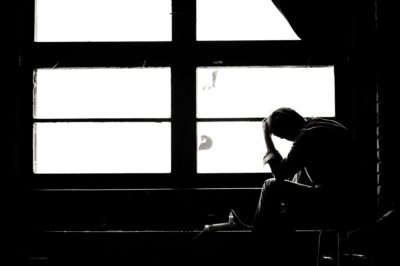PPE: Face Masks and COVID-19
Posted: Jul. 15, 2020

Surgical or medical masks
A surgical mask is a loose-fitting, disposable device that creates a physical barrier between the mouth and nose of the wearer and potential contaminants such as droplets containing COVID-19. Surgical masks are regulated by the U.S. FDA and by Health Canada. Surgical masks are not to be shared and may be labeled as surgical, isolation, dental, or medical procedure masks.
Non-surgical or non-medical masks
Disposable and re-usable masks that can be purchased or made at home, might resemble or even be referred to as “surgical masks”, however if the masks are unregulated, they are non-medical. Recommending that the public use “non-surgical” masks, means reserving regulated masks for the medical personnel and health care workers who require them.
Respirators

Respirators are devices tested and certified by an approved agency (NIOSH) to protect the user against a hazardous atmosphere. The most common respirator used in health care is a N95 half-face piece, filtering respirator. It is a disposable personal protective device that fits tightly around the nose and mouth of the wearer, and is used to reduce the risk of inhaling hazardous airborne particles and aerosols, including dust particles and infectious agents.
Using non-medical face masks
To reduce the spread of COVID-19, Health Canada currently recommends wearing a homemade cloth non-medical mask/facial covering when it is not possible to consistently maintain a 2-metre physical distance from others, particularly in crowded settings. These masks, when worn and cared for properly can reduce the spread of the wearer’s infectious droplets. Health Canada comprehensive recommendations for making, using and caring for cloth non-medical masks can be found at:

Best practices and hazard assessments
A hazard and risk assessment must be used to determine appropriate hazard controls. Use your task specific hazard assessment to determine what PPE will be required to provide your employees with acceptable COVID-19 protection at work. Essential workers may be required to work in conditions that require a respirator that will protect the wearer from COVID-19. Remember the hierarchy of controls and that PPE should not be relied upon as the sole hazard control. InUnison has comprehensive COVID-19 protection tools available for your use under our COVID-19 Management program.
Facemasks: I protect you and you protect me
The following material was either used in the preparation of this newsletter or can be accessed if you require additional information:
InUnison COVID-19 Management Program
Government of Canada, COVID-19 medical masks and N95 respirators
U.S. Food and Drug Administration, respirators, Surgical Masks, and Face Masks
Related Articles

Psychological Health and Safety
According to the Mental Health Commission of Canada: “30 per cent of short- and long-term disability claims in Canada are […]
Read Article
Ergonomics – Chronic Back Injuries
My back hurts from time to time, but that seems normal around here There is nothing “normal” about pain whether […]
Read Article